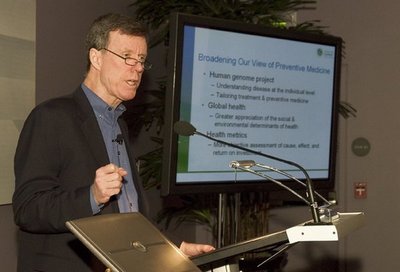April 10, 2008
UW Medicine and Premera host Health Summit
As major employers and payers of health care benefits, businesses have a vested interest in reducing health care costs and improving the health status of their employees. On March 27, UW Medicine and Premera Blue Cross hosted the first-ever Washington Business & Health CEO Summit to address the prickly issues of rising health costs and rising health risks by focusing on prevention and wellness.
“The status of health care is not good and quite soon it will be on life support,” said Gubby Barlow, chief executive officer of Premera and co-founder of the Health Summit.
“If health costs continue to increase, it will bankrupt our children and grandchildren. Health care costs are outrunning the economy. We’re relying on technology instead of our own good choices. We must move from an age of big medicine to an age of personal accountability.”
Barlow noted that lifestyle changes and prevention are one part of the solution to the health care cost crisis.
“In addition, focusing on evidence-based best practices in the delivery of care could save up to 30 percent of health care costs without diminishing our health status,” said Barlow. “We must conduct more comparative effectiveness studies and use this information to invest in what produces the best results.”
Executive officers from Alaska Air Group, Blue Cross and Blue Shield Association, Ben Bridge Jewelers, Costco, Delta Airlines, Washington State Health Care Authority, Starbucks, PEMCO Insurance, REI, Savers, Inc., Sellen Construction, Green Diamond Company, Wells Fargo and Weyerhaeuser attended the Summit. Companies represented at the table have more than 700,000 employees.
“The significance of the summit is that we’ve attracted some of the biggest businesses in the state because of their concern regarding health care costs in the United States,” Barlow said. “These businesses are willing to roll up their sleeves and help those of us who are more entrenched in the health care industry make changes for the better.”
The business leaders heard experts in science and finance make the business case for the prevention of heart disease and cancer, two of the most costly and preventable diseases in the United States.
“Why target heart disease and cancer?” asked Dr. Paul Ramsey, chief executive officer of UW Medicine and Health Summit cofounder. “If you look at Premera’s payments — 10 percent of their payments to UW Medicine are related to preventable heart disease and cancer. In addition, costs related to cancer are going up 110 percent faster per year than the average rate of health care payments.
“There are simple things that we know work to improve health — behavioral factors such as diet, exercise, not smoking, and proper screening. More effective preventive medicine programs in these areas can save millions of dollars.”
Dr. Richard Page, UW professor and head of the Division of Cardiology, told the group that coronary heart disease is the leading cause of death and disability in the U.S. and the developed world. “Optimal approaches to prevention include promoting a healthy lifestyle — diet, exercise, stress reduction, and smoking cessation.”
Dr. Scott Ramsey, UW professor and director of the Cancer Technology Assessment Group at Fred Hutchinson Cancer Research Center, made the case for cancer prevention. “Based on epidemiologic studies, cancer researchers estimate that up to 70 percent of all cancers can be prevented through lifestyle modification and screening,” he said.
Audrey Halvorson, senior vice president and chief actuary of Premera Blue Cross, said “millions of dollars are spent on preventable diseases and millions more on lost wages. Prevention can save health care dollars, lost wages, productivity and life.”
What better place to target prevention and wellness than in the workplace, where people spend a lot of time? Employers have captive audiences and can set the stage for improving health care outcomes, physically and fiscally.
Employers can help themselves lower costs and increase productivity by encouraging behavioral lifestyle changes, creating work environments that support healthy lifestyles, and working on public policy. Summit participants heard from companies that have launched successful wellness and prevention programs and discussed the possibilities for their businesses.
For example, the Pitney Bowes’ company program focuses on health enhancement and preventive care, innovative approaches to creating a workplace environment of health and lifestyle improvement, and a health plan that rewards healthy choices and individual accountability.
The Microsoft Corporation is a national leader in implementing a multidisciplinary approach to obesity management, a key risk factor for many diseases, including heart disease and cancer.
Dr. Paul Ramsey said business leaders today have an “enormous opportunity to save money and to improve health” by investing in health programs at work.
Looking ahead, Ramsey projected that “over the next 10 to 20 years, we will see radical change in the approach to prevention, as a result of major advances in genomics, global health and health metrics.
“The Human Genome Project will increase our understanding of disease at the cellular level and will allow us to personalize medicine,” Ramsey said.
“Global health initiatives have broadened our perspective of what is global — the social, political, and environmental conditions will affect our approaches to prevention. The science of health metrics, evaluating the effectiveness of particular interventions in health care outcomes and costs will also lead to substantial changes to prevention over the next several decades.”


